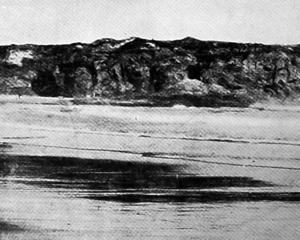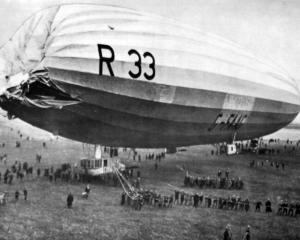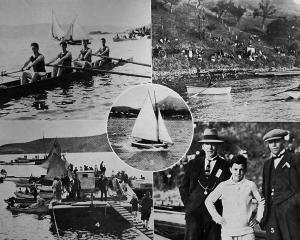
Three of the crew were drowned-viz, Messrs G. W. Hinchey (lamp trimmer), B. Kyle, and J. Hunter (firemen).
Captain A. Gibson and the remainder of the crew of nine men, were saved.
There were no passengers on board.
The steamer left the town wharf at 11 p.m. for Wellington.
Shortly before midnight distress signals were seen from near the end of the south mole by men at the pilot station.
The harbour master (Captain McIntyre), with several volunteers, immediately proceeded to the scene with life-saving apparatus.
They discovered six survivors on the mole and four others clinging to the capsized hull of the steamer, which was showing in the breakers about 200 feet off the mole.
With the second rocket fired a line was thrown across the hull, and the four men were brought ashore in a basket.
According to the members of the crew the Stormbird was in light trim, and, on reaching the harbour entrance, failed to answer her helm.
The vessel was driven against the mole and heavy seas swept over her, extinguishing the fires.
The steamer eventually cut her way through the mole until held by the rocks, at the part under the engine room. It was at this stage that six of their number scrambled ashore.
The vessel suddenly snapped into two pieces, before capsizing.
At the time of the disaster the night was dark and the heavy ground swell made for a lumpy sea.
The vessel was returning to Wellington, having only a few tons of cargo on board.
• The Seaward Downs correspondent of the Wyndham Farmer gives particulars of a terrific electrical storm which recently passed over a short compass of space in that locality.
After the lightning and thunder, the storm rushed with great force between two posts of a fence situated about three chains from the homestead of Mrs McKenzie.
Both posts were shattered, just as though a charge of blasting powder had been fired into them, and chips of wood were found fully two chains away — all in one direction, proving that the force had been in a S. W. to N. E. direction.
The severed wires (five) of the fence gave the appearance of having passed through a furnace, the top barb especially so, 9ft of it having absolutely disappeared; and from the appearance of what remained it would appear that that particular piece had been completely melted.
The lightning appeared to have travelled along the fence in both directions, and was easily traceable by the burned appearance of the wire.
• The authorities express the hope that the enrolment required under the Military Service Act will be done voluntarily within the next fortnight.
If any man fails in his duty he acts unfairly to the men who enrol and to the soldiers who are fighting overseas.
If moral suasion does not move a man to take the honourable course in time, the strong hand of the law can grip him and punish him memorably.
Throughout the country every possible care will be taken to detect attempts at evasion, and the penalty for the convicted may be very heavy.
The person who tries to escape, at the sacrifice of his own honour, is liable to a large fine or imprisonment, and forfeits a chance at the ballot.
Anybody who is convicted on a charge of aiding or abetting any man to dodge his duty is liable to a fine or imprisonment.
Employers are forbidden to engage or retain in their service non-enrolled Reservists or deserters. — ODT, 4.9.1916.
• COPIES OF PICTURE AVAILABLE FROM ODT FRONT OFFICE, LOWER STUART ST, OR WWW.OTAGOIMAGES.CO.NZ












